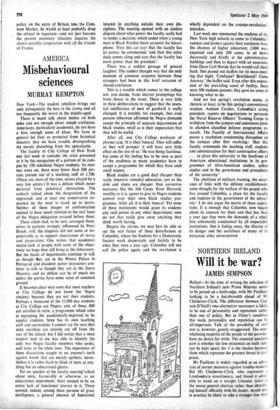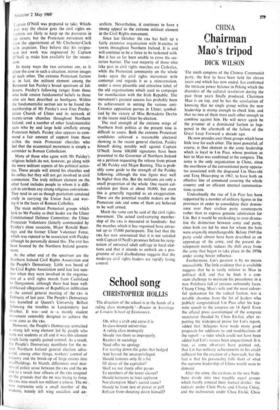Will it be war?
NORTHERN IRELAND JAMES SIMPSON
Belfast—At the time of writing the selection of Northern Ireland's next Prime Minister seems to be poised on a knife-edge, with Mr Faulkner looking to be a hairsbreadth ahead of Mr Chichester-Clark. The difference between Cap- tain O'Neill's two alternative successors is likely to be one of personality and reputation rather than one of policy. But in Ulster's condition this week, personality and reputation can be all-important. Talk of the possibility of civil war is, however, greatly exaggerated. The over- whelming majority of the people of the province have no desire for strife. The essential question now is whether the few extremists on both sides can be kept apart, for it is the clashes between them which represent the greatest threat to civil peace.
Mr Faulkner is widely regarded as an advo- cate of sterner measures against trouble-makers. But Mr Chichester-Clark, who represents a Londonderry constituency, and found it advis- able to stand on a straight Unionist ticket- at the recent general election rather than identify- ing himself officially with his leader, would also in practice be likely to take a stronger line than
Ciptain O'Neill was prepared to take. Which- ever way the choice goes the civil rights ex- tremists are likely to keep up the pressures in the streets; but the Protestant extremists will view the appointment of Mr Chichester-Clark with suspicion. They believe that his resigna- tion last week was engineered by Captain O'Neill to make him available for the succes- sion.
In many ways the two extremes are, as is often the case in such a situation, mirror images of each other. The extreme Protestant faction is, in fact, the militant element among the Reverend Ian Paisley's broad spectrum of fol- lowers. Paisley's following ranges from those who hold sincere fundamental beliefs to those who are best described as hooligans. Within the fundamentalist section are to be found the membership of Mr Paisley's own Free Presby- terian Church of Ulster and its network of twenty-seven churches throughout Northern Ireland; and a number of other fundamentalist sects who by and large hold similarly strong Protestant beliefs. Paisley also appears to com- mand a fair amount of support from those within the main Protestant churches who feel that the ecumenical movement is simply-a surrender to Roman Catholicism.
Many of those who agree with Mr Paisley's religious beliefs do not, however, go along with the more militant aspects of his political activi- ties. These people will attend his churches and his rallies but they will not get involved in civil commotion. The truly militant element on the other hand includes people to whom it is diffi- cult to 'attribute any strong religious convictions. They tend to act as though patriotism consisted solely in carrying the Union Jack and wav- ing it in the faces of Roman Catholics.
The main militant Protestant groups which look to Mr Paisley as their leader are the Ulster Constitutional Defence Committee; the Ulster Protestant Volunteers (latterly commanded by Paisley's close associate, Major Ronald Bunt- ing); and the former Ulster Volunteer Force, which was reputed to be associated with Paisley although he personally denied this. The UVF has been banned by the Northern Ireland govern- ment.
At the other end of the spectrum are the Northern Ireland Civil Rights Association and the People's Democracy. Little was heard of the Civil Rights Association until late last sum- mer when they were involved in the organisa- tion of a civil rights march from Coalisland
to Dungannon, although there had been well- publicised allegations of Republican infiltration at the annual general meeting of the CRA in February of last year. The People's Democracy was launched at Queen's University Belfast following the troubles in Londonderry last October. It was—and is—a mainly student movement ostensibly designed to achieve the same aims as the CRA.
However, the People's Democracy contained a strong left wing element led by people who Were not students at all and it was this element
hich fairly rapidly gained control. As a result, the People's Democracy manifesto for the re-
cent Northern Ireland general election advo-
cated, among other things, workers' control of industry and the break-up of large estates into smallholdings. In March, differences aver mat- ters of policy arose between the CRA and the PD and as a result four officers of the CRA resigned on the grounds that the PD was trying to force the cite into much too militant a course. The PD. now represents only a small number of the students, mainly left wing socialists and an-.
archists. Nevertheless, it continues to have a strong appeal to the extreme militant element in the Civil Rights movement.
Since last October the caa has built up a fairly extensive organisation with branches in towns throughout Northern Ireland. It is and will continue to be a force to be reckoned with. But it has so far been unable to cross the sec- tarian barrier. The vast majority of those who take part in civil rights marches are Catholics, while the Protestant community on the whole looks upon the civil rights movement with contempt and regards it as a reincarnation, under a more plausible and attractive label, of the old organisations which used to campaign for reunification with the Irish Republic. The movement's greatest success has probably been its achievement in uniting the various anti- Unionist opposition parties in Ulster; symbol- ised by the victory of Miss Bernadette Devlin in the recent mid-Ulster by-election.
The real strength of the extreme wings of Northern Irish politics at the present time is difficult to assess. Both the extreme Protestant candidates achieved a reasonable electoral showing in the recent general election, Paisley himself doing notably well against Captain O'Neill. Some 100,000 signatures have been presented to the Governor of Northern Ireland on a petition requesting the release from prison of Mr Paisley and Major Bunting. This is prob- ably some guide to the strength of the Paisley, following, although the true figure may well be higher than this. But the militants are only a small proportion of the whole. One recent cal- culation put them at about 10,000, but even this is generally regarded as an exaggeration. These are the potential trouble makers on the Protestant side and some of them are believed to be well armed.
Much the same can be said of the civil rights movement. The actual card-carrying member- ship of the CRA is measured in hundreds: but the marches which it has organised have attrac- ted up to 15,000 participants. The fact that the CRA has now announced that it is not satisfied with Captain O'Neill's promises before his resig- nation of universal adult suffrage in local elec- tions and that it intends to embark on a pro- gramme of civil disobedience suggests that the moderate civil rights leaders are rapidly losing control.



































 Previous page
Previous page